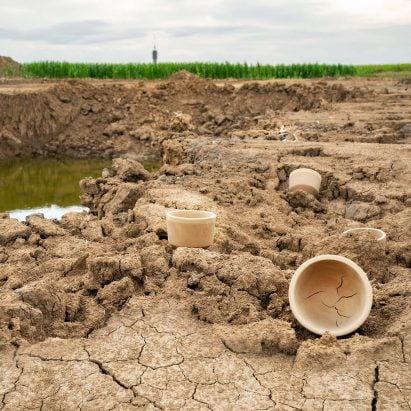Design studio Atelier NL is finding new uses for some of the four million cubic metres of clay being unearthed by the widening of the Maas river in the Netherlands.
Atelier NL founders Nadine Sterk and Lonny van Ryswyck are using this unearthed clay to produce ceramic plates, bowls and cups in a range of terracotta tones.
The clay was unearthed as part of the widening and reinforcement of the Maas river
They are also turning it into bricks that can be sold or donated, to local schools for instance, so that other people can experiment with clay modelling.
“The idea is that people can work with the river clay rather than clay they buy in the shops,” Van Ryswyck told Dezeen. “You put it in water and in two days you can mould with it.”
Atelier NL used the clay to make plates, bowls and cups
The Meanderende Maas infrastructure project is a six-year-long programme to strengthen the 26-kilometre dike between the Dutch towns of Ravenstein and Lith, and the floodplains on both sides of the river.
The project is expected to unearth at least four million cubic metres of clay, with some of this to be used for the dike reinforcement and the rest being sold to brick factories.
The designers are also producing bricks for clay modelling
Sterk and Van Ryswyck wanted to show how the clay could also be used in other ways, turning it into useful products that celebrate the natural diversity of the Dutch soil.
They took six cubic metres of the clay – a tiny fraction of the overall volume, but enough to make 9,000 plates, according to Van Ryswyck.
The Dutch Design Week exhibition centred around a clay “mountain”
This provided the material for their first Maas Clay Tableware collection and sculpting clay bricks, which were exhibited in the Atelier NL studio during Dutch Design Week.
The rest was piled up in the centre of the studio in the form of a clay “mountain”.
This formed the centrepiece of an exhibition exploring the role of the river in the lives of different individuals: a local resident, contractor, hiker, designer and dyke warden, a stork and the river itself.
For the designers, one of the biggest challenges of the project was persuading those behind the government-funded river widening project that there was value in exploring other uses for the clay.
“I was pitching for about half a year to convince them,” said Van Ryswyck.
The ceramics celebrate the natural diversity of the Dutch soil
Atelier NL hosted a dinner for the contractors as part of the exhibition programme, serving food on the Maas Clay Tableware. It was the starting point for a dialogue that Van Ryswyck hopes will continue.
“They told us we gave them a new perspective on what they can do,” Van Ryswyck said. “It’s a really important step towards seeing what can be changed.”
“We want everyone to be able to work with this river clay,” she added.
The exhibition explored the role of the river in the lives of different individuals
Sterk and Van Ryswyck founded Atelier NL in 2007. They work primarily with ceramics and glass, with a specific focus on waste materials and local supply chains.
They designed the trophy for the first edition of Dezeen Awards, which was made from London clay.
Exhibition photography is by Ruud Balk and Anwyn Howarth.
The post Maas river widening provides clay for Atelier NL’s ceramics and bricks appeared first on Dezeen.

